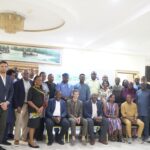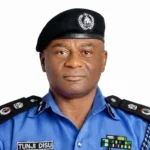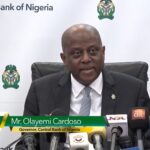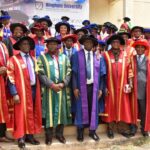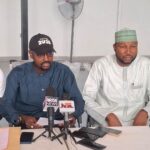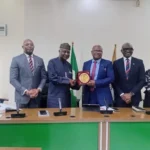COVID-19 pandemic, credible electoral process and matters arising
A News Analysis by Emmanuel Oloniruha, News Agency of Nigeria (NAN)
The conduct of credible elections remains one of the crucial issues for any country that practises democracy.
However, the outbreak of COVID-19 pandemic has not only disrupted activities in societies, economies and lives across nations, presenting a somewhat difficult situation for the conduct of elections.
Just as the world has to adapt to the new reality of COVID-19 pandemic, the challenges of Election Management Bodies (EMBs) have increased from the conduct of credible elections to adopting measures critical in having safe elections without further spread of the virus.
With the spread of the virus in 2020, the electoral calendar has been punctuated by postponed elections in many nations, with decision makers and election authorities faced with a difficult question of whether or not to postpone elections.
Stakeholders express concerns over tendency by incumbents to explore the difficulty in holding elections to extend their mandates.
According to a publication by the International Institute for Democracy and Electoral Assistance (International IDEA), as at September 2020, globally at least 67 countries have postponed national and sub-national elections while 48 countries have held such elections.’’
“The initial reaction to the pandemic in March led to a large number of countries declaring states of emergency (or de facto states of emergency), putting their populations into lockdown’’, the publication said.
IDEA noted that some of the decisions taken by some countries based on the pandemic “are likely to impact on elections for years to come.
In Nigeria, when the pandemic broke out in Nigeria recorded its COVID-19 index case on February 27, 2020, the country was already preparing for major elections, including pending by-elections, Edo and Ondo State governorship elections scheduled for Sept. 19, 2020 and Oct. 10, 2020 respectively.
The pandemic did not just affect the activities of the Independent National Electoral Commission (INEC), it also led to some consequential amendments to the 2019 Regulations and Guidelines for the Conduct of Elections.
Following lockdown declaration by the government due to COVID-19, INEC on March 24, 2020 postponed the conduct of four by-elections – Bayelsa Central and Bayelsa West, Imo North and Plateau South Senatorial Districts by-elections.
Announcing the suspension, INEC National Commissioner and Chairman, Information and Voter Education Committee, Festus Okoye, said it was in view of the coronavirus pandemic and the preventive measures put in place by the federal and state government.
Also, at the commission’s first virtual meeting with the Resident Electoral Commissioners (RECs) in May, INEC Chairman, Prof. Mahmood Yakubu, assured Nigerians that while the commission would take the COVID-19 pandemic seriously, the democratic and electoral processes could not be truncated.
Yakubu said INEC was determined to hold some bye-elections ahead of Edo and Ondo State governorship to enable it to test-run and fine-tune its modified processes in view of the COVID-19 pandemic.
He said INEC was studying reports of recent elections conducted under COVID-19 pandemic, especially in Mali and South Korea, for lessons that would strengthen the processes and protect all those involved.
In line with its promised not to allow the pandemic to jeopardise Nigeria election, on May 13, 2020, INEC directed immediate reopening of its headquarters, Edo and Ondo State offices in preparation for the states governorship elections, following the gradual ease of the lockdown.
On May 25, 2020, INEC approved and released a new policy framework known as “Policy on Conducting Elections in the Context of COVID-19 Pandemic.’’
The Policy enables officials and staff of the commission to understand and respond adequately to the challenges of conducting elections in the context of the COVID-19 pandemic, as well provide a guide for engagement with stakeholders.
The document covers health and legal issues, election planning and operations, election day and post-election activities.
It also covers voter registration, political parties, election observation, electoral security and deployment of technology.
Measures taken in line with the document includes the mandatory use of face masks at Polling Units (PUs) and all election locations, creation of a two-tier queuing system at the polling unit — one outside and the other in the voting area — stating that voters will be brought into the voting area periodically to prevent overcrowding.
The commencement of poll also changed from 8 a.m. to 8.30 a.m. and the closing time from 2 p.m. to 2.30 p.m., to accommodate additional activities in setting up the PU due to COVID-19 pandemic.
Others include regular disinfection of the Smart Card Readers (SCR) after each voter’s fingerprint is read.
Making public presentation of the policy, Yakubu also announced the redesign of polling units to ensure substantial compliance with the COVID-19 protocols established by health authorities.
He said that the commission also developed a Voter Code of Conduct (VCC) document detailing how voters were expected to act and conduct themselves at the polling units in the light of the COVID-19 pandemic
There was also establishment of additional voting points to reduce the number of points in a polling unit to be monitored and controlled for COVID-19 safety protocol compliance.
Others include review of all INEC Elections Information Kits to include COVID-19 information; expanded the Inter-Agency Consultative Committee on Election Security at all levels to include Nigeria Centre for Disease Control (NCDC) (or other requisite health bodies) and National Orientation Agency (NOA) on a temporary basis.
Also, on June 1, 2020, at the first virtual consultative meeting of the commission with leaders of political parties, Yakubu announced the design of dedicated portal through which political parties that contested for Edo governorship poll submitted the nomination forms of their candidates.
In the spirit of deepening the use of technology in the country’s electoral process and to reduce the level of physical contacts in line with the new reality, INEC also introduced online process for accreditation of media and election observers.
Yakubu reassured Nigerians that INEC would continue to adopt and implement measures to mitigate the impact of the COVID-19 pandemic on the country’s electoral activities.
To experiment the policy documents, the commission on Aug. 8, 2020, held a successful by-election in Nasarawa Central State Constituency which took place in seven wards, 44 polling units and other voting points, with 71,919 registered voters.
Although one of the challenges faced by INEC in the conduct of the by-elections was enforcing physical distancing, the commission embarked on further training of its presiding officers and public enlightenment to address the occurrence in the conduct of Edo and Ondo State governorship election.
Aside the aforementioned steps taken to adjust to the new reality of pandemic, while working on safe measures to hold elections, between April 2020 and May 2020, INEC deployed no fewer than 160 of its operational vehicles to not less nine states to support the Presidential Task Force (PTF) on COVID-19 in tackling the pandemic.
According to Okoye, the pick-up vans were deployed to Lagos, Osun, Oyo State, Kano State, Rivers, Plateau, Sokoto State and FCT, for contact tracing, surveillance/laboratory and infection prevention/control in the states.
Okoye said that the vehicles were deployed in response to the request by the PTF to facilitate the movement of medical personnel for massive contact tracing and testing in the states.
He said that the commission was equally working with the Nigerian Communications Commission (NCC) and telecommunication service providers to assist in raising public awareness of the pandemic by sending bulk messages to registered voters similar to what INEC did for voter mobilisation.
He added that INEC was also discussing with the Ministry of Humanitarian Affairs, Disaster Management and Social Development on the possibility of using its electoral registration units nationwide as locations for the distribution of palliative and other relief materials to citizens.
Okoye said the commission would continue to work with all agencies and stakeholders to combat COVlD-19 virus.
Stakeholders, however, commended INEC that in spite of the pandemic and other challenges, including fire disaster at its Akure office that destroyed more than 5,000 Smart Card Readers, the commission successful conducted Nasarawa Central State Constituency by-election, Edo and Ondo State in 2020.
It also conducted 15 pending by-elections, including Bayelsa Central Senatorial District, Bayelsa West Senatorial District, Nganzai and Bayo constituencies in Borno, Cross River North Senatorial District and Obudu Constituency in Cross River.
Others were Imo North Senatorial District, Lagos East Senatorial District, Kosofe II Constituency in Lagos State, Plateau South Senatorial District; Bakura Constituency in Zamfara and Ibaji Constituency in Kogi.
The Interim National Chairman, Inter-party Advisory Council (IPAC), Dr Leonard Nzenwa, who is also the National Chairman, African Action Congress (AAC), commended INEC for its policy for conducting elections under the COVID-19 pandemic.
Stakeholders, therefore, express optimism that INEC will sustain these measures and standard recorded in 2020 and improve on them in 2021 to conduct credible elections in the event of COVID-19 pandemic.(NANFeatures)
**If used, please credit the writer as well as News Agency of Nigeria (NAN)


